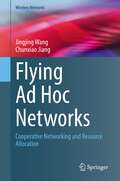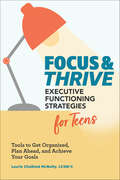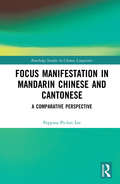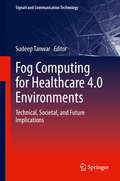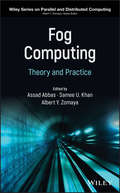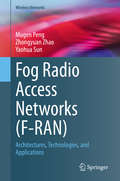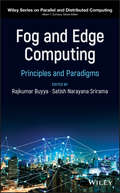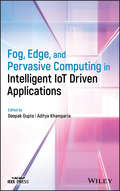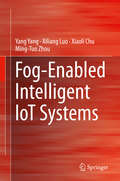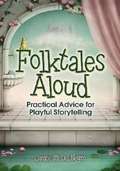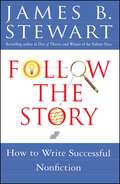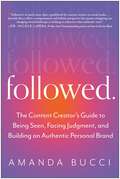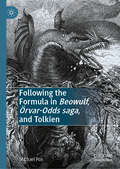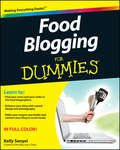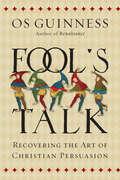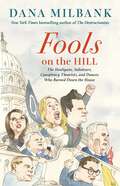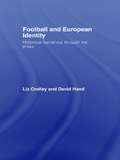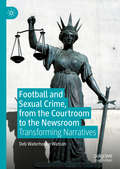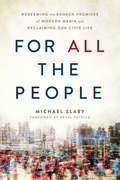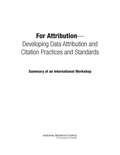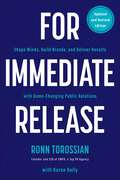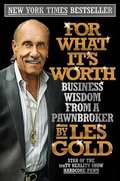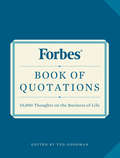- Table View
- List View
Flying Ad Hoc Networks: Cooperative Networking and Resource Allocation (Wireless Networks)
by Chunxiao Jiang Jingjing WangRelying on unmanned autonomous flight control programs, unmanned aerial vehicles (UAVs) equipped with radio communication devices have been actively developed around the world. Given their low cost, flexible maneuvering and unmanned operation, UAVs have been widely used in both civilian operations and military missions, including environmental monitoring, emergency communications, express distribution, even military surveillance and attacks, for example. Given that a range of standards and protocols used in terrestrial wireless networks are not applicable to UAV networks, and that some practical constraints such as battery power and no-fly zone hinder the maneuverability capability of a single UAV, we need to explore advanced communication and networking theories and methods for the sake of supporting future ultra-reliable and low-latency applications. Typically, the full potential of UAV network’s functionalities can be tapped with the aid of the cooperation of multiple drones relying on their ad hoc networking, in-network communications and coordinated control. Furthermore, some swarm intelligence models and algorithms conceived for dynamic negotiation, path programming, formation flight and task assignment of multiple cooperative drones are also beneficial in terms of extending UAV’s functionalities and coverage, as well as of increasing their efficiency. We call the networking and cooperation of multiple drones as the terminology ‘flying ad hoc network (FANET)’, and there indeed are numerous new challenges to be overcome before the idespread of so-called heterogeneous FANETs. In this book, we examine a range of technical issues in FANETs, from physical-layer channel modeling to MAC-layer resource allocation, while also introducing readers to UAV aided mobile edge computing techniques.
Focus & Thrive: Tools to Get Organized, Plan Ahead, and Achieve Your Goals
by Laurie Chaikind McNultyConceive, believe, achieve—strategies to help teens ages 13 to 17 build executive functioning skillsExecutive functioning is the way we manage our daily lives, including organization, planning ahead, and getting started on important tasks. These abilities may be easier for some and more challenging for others to master. Focus and Thrive is full of practical tools to help teens uncover strengths and develop executive functioning skills like staying focused, getting organized, making plans, and managing time.From creating a checklist to maintaining a daily routine, this supportive executive functioning guide can help you feel more confident in finishing everyday tasks at school, at home, at work, and beyond. Ultimately, this straightforward approach to building executive function skills will put you on the path to achieving your goals with focus and determination.This executive functioning book for teens features:Step-by-step solutions—Discover simple strategies to tackle difficult situations you face everyday.Easy "life hacks"—Learn how you can overcome challenges like forgetting your belongings, communicating your needs, and more.Powerful tools—Find a system that works for you with graphic organizers and sample checklists you can copy and reuse.Develop better organization and time-management skills with this executive functioning resource for teens.
Focus Manifestation in Mandarin Chinese and Cantonese: A Comparative Perspective (Routledge Studies in Chinese Linguistics)
by Peppina Po-lun LeeOne prominent function of natural language is to convey information. One peculiarity is that it does not do so randomly, but in a structured way, with information structuring formally recognized to be a component of grammar. Among all information structuring notions, focus is one primitive needed to account for all phenomena. Focus Manifestation in Mandarin Chinese and Cantonese: A Comparative Perspective aims to examine from a semantic perspective how syntactic structures and focus adverbs in Mandarin Chinese and semantic particles in Cantonese conspire to encode focus structures and determine focus manifestation in Chinese. With both as tonal languages, Mandarin Chinese and Cantonese manifest different morpho-syntactic configurations to mark focus. A general principle governing focus marking in Mandarin Chinese and Cantonese is given in the book, which aims to give a better understanding on the underlying principles the two used to mark additive and restrictive meanings, and related focus interpretations. Particular attention is also drawn to the co-occurrence of multiple forms of restrictive and additive particles in Cantonese, including adverbs, verbal suffixes and sentence-final particles. Linearity has shown to be an important parameter to determine how focus is structured in Cantonese. This book is aimed at advanced graduate students, researchers and scholars working on Chinese linguistics, syntax and semantics, and comparative dialectal grammar.
Fog Computing for Healthcare 4.0 Environments: Technical, Societal, and Future Implications (Signals and Communication Technology)
by Sudeep TanwarThis book provides an analysis of the role of fog computing, cloud computing, and Internet of Things in providing uninterrupted context-aware services as they relate to Healthcare 4.0. The book considers a three-layer patient-driven healthcare architecture for real-time data collection, processing, and transmission. It gives insight to the readers for the applicability of fog devices and gateways in Healthcare 4.0 environments for current and future applications. It also considers aspects required to manage the complexity of fog computing for Healthcare 4.0 and also develops a comprehensive taxonomy.
Fog Computing: Theory and Practice (Wiley Series on Parallel and Distributed Computing)
by Albert Y. Zomaya Samee U. Khan Assad AbbasSummarizes the current state and upcoming trends within the area of fog computing Written by some of the leading experts in the field, Fog Computing: Theory and Practice focuses on the technological aspects of employing fog computing in various application domains, such as smart healthcare, industrial process control and improvement, smart cities, and virtual learning environments. In addition, the Machine-to-Machine (M2M) communication methods for fog computing environments are covered in depth. Presented in two parts—Fog Computing Systems and Architectures, and Fog Computing Techniques and Application—this book covers such important topics as energy efficiency and Quality of Service (QoS) issues, reliability and fault tolerance, load balancing, and scheduling in fog computing systems. It also devotes special attention to emerging trends and the industry needs associated with utilizing the mobile edge computing, Internet of Things (IoT), resource and pricing estimation, and virtualization in the fog environments. Includes chapters on deep learning, mobile edge computing, smart grid, and intelligent transportation systems beyond the theoretical and foundational concepts Explores real-time traffic surveillance from video streams and interoperability of fog computing architectures Presents the latest research on data quality in the IoT, privacy, security, and trust issues in fog computing Fog Computing: Theory and Practice provides a platform for researchers, practitioners, and graduate students from computer science, computer engineering, and various other disciplines to gain a deep understanding of fog computing.
Fog Radio Access Networks: Architectures, Technologies, and Applications (Wireless Networks)
by Mugen Peng Zhongyuan Zhao Yaohua SunThis book provides a comprehensive introduction of Fog Radio Access Networks (F-RANs), from both academic and industry perspectives. The authors first introduce the network architecture and the frameworks of network management and resource allocation for F-RANs. They then discuss the recent academic research achievements of F-RANs, such as the analytical results of theoretical performance limits and optimization theory-based resource allocation techniques. Meanwhile, they discuss the application and implementations of F-RANs, including the latest standardization procedure, and the prototype and test bed design. The book is concluded by summarizing the existing open issues and future trends of F-RANs. Includes the latest theoretical and technological research achievements of F-RANs, also discussing existing open issues and future trends of F-RANs toward 6G from an interdisciplinary perspective; Provides commonly-used tools for research and development of F-RANs such as open resource projects for implementing prototypes and test beds;Includes examples of prototype and test bed design and gives tools to evaluate the performance of F-RANs in simulations and experimental circumstances.
Fog and Edge Computing: Principles and Paradigms (Wiley Series on Parallel and Distributed Computing)
by Rajkumar Buyya Satish Narayana SriramaA comprehensive guide to Fog and Edge applications, architectures, and technologies Recent years have seen the explosive growth of the Internet of Things (IoT): the internet-connected network of devices that includes everything from personal electronics and home appliances to automobiles and industrial machinery. Responding to the ever-increasing bandwidth demands of the IoT, Fog and Edge computing concepts have developed to collect, analyze, and process data more efficiently than traditional cloud architecture. Fog and Edge Computing: Principles and Paradigms provides a comprehensive overview of the state-of-the-art applications and architectures driving this dynamic field of computing while highlighting potential research directions and emerging technologies. Exploring topics such as developing scalable architectures, moving from closed systems to open systems, and ethical issues rising from data sensing, this timely book addresses both the challenges and opportunities that Fog and Edge computing presents. Contributions from leading IoT experts discuss federating Edge resources, middleware design issues, data management and predictive analysis, smart transportation and surveillance applications, and more. A coordinated and integrated presentation of topics helps readers gain thorough knowledge of the foundations, applications, and issues that are central to Fog and Edge computing. This valuable resource: Provides insights on transitioning from current Cloud-centric and 4G/5G wireless environments to Fog Computing Examines methods to optimize virtualized, pooled, and shared resources Identifies potential technical challenges and offers suggestions for possible solutions Discusses major components of Fog and Edge computing architectures such as middleware, interaction protocols, and autonomic management Includes access to a website portal for advanced online resources Fog and Edge Computing: Principles and Paradigms is an essential source of up-to-date information for systems architects, developers, researchers, and advanced undergraduate and graduate students in fields of computer science and engineering.
Fog, Edge, and Pervasive Computing in Intelligent IoT Driven Applications
by Deepak GuptaA practical guide to the design, implementation, evaluation, and deployment of emerging technologies for intelligent IoT applications With the rapid development in artificially intelligent and hybrid technologies, IoT, edge, fog-driven, and pervasive computing techniques are becoming important parts of our daily lives. This book focuses on recent advances, roles, and benefits of these technologies, describing the latest intelligent systems from a practical point of view. Fog, Edge, and Pervasive Computing in Intelligent IoT Driven Applications is also valuable for engineers and professionals trying to solve practical, economic, or technical problems. With a uniquely practical approach spanning multiple fields of interest, contributors cover theory, applications, and design methodologies for intelligent systems. These technologies are rapidly transforming engineering, industry, and agriculture by enabling real-time processing of data via computational, resource-oriented metaheuristics and machine learning algorithms. As edge/fog computing and associated technologies are implemented far and wide, we are now able to solve previously intractable problems. With chapters contributed by experts in the field, this book: Describes Machine Learning frameworks and algorithms for edge, fog, and pervasive computing Considers probabilistic storage systems and proven optimization techniques for intelligent IoT Covers 5G edge network slicing and virtual network systems that utilize new networking capacity Explores resource provisioning and bandwidth allocation for edge, fog, and pervasive mobile applications Presents emerging applications of intelligent IoT, including smart farming, factory automation, marketing automation, medical diagnosis, and more Researchers, graduate students, and practitioners working in the intelligent systems domain will appreciate this book’s practical orientation and comprehensive coverage. Intelligent IoT is revolutionizing every industry and field today, and Fog, Edge, and Pervasive Computing in Intelligent IoT Driven Applications provides the background, orientation, and inspiration needed to begin.
Fog-Enabled Intelligent IoT Systems
by Xiaoli Chu Yang Yang Xiliang Luo Ming-Tuo ZhouThis book first provides a comprehensive review of state-of-the-art IoT technologies and applications in different industrial sectors and public services. The authors give in-depth analyses of fog computing architecture and key technologies that fulfill the challenging requirements of enabling computing services anywhere along the cloud-to-thing continuum. Further, in order to make IoT systems more intelligent and more efficient, a fog-enabled service architecture is proposed to address the latency requirements, bandwidth limitations, and computing power issues in realistic cross-domain application scenarios with limited priori domain knowledge, i.e. physical laws, system statuses, operation principles and execution rules. Based on this fog-enabled architecture, a series of data-driven self-learning applications in different industrial sectors and public services are investigated and discussed, such as robot SLAM and formation control, wireless network self-optimization, intelligent transportation system, smart home and user behavior recognition. Finally, the advantages and future directions of fog-enabled intelligent IoT systems are summarized. Provides a comprehensive review of state-of-the-art IoT technologies and applications in different industrial sectors and public servicesPresents a fog-enabled service architecture with detailed technical approaches for realistic cross-domain application scenarios with limited prior domain knowledgeOutlines a series of data-driven self-learning applications (with new algorithms) in different industrial sectors and public services
Folktales Aloud: Practical Advice For Playful Storytelling
by Janice M. Del NegroA good folktale triggers the imagination, connecting children to a wider world as well as increasing their vocabulary and comprehension skills. In this delightful and easy-to-use book, teacher and storyteller Del Negro gives librarians, teachers, and parents the keys to storytelling success. Including more than a dozen original adaptations of folktales from around the world, tailored specifically for library and classroom use, she Reviews storytelling basics such as selecting a tale and learning the story Offers tips for dealing with stage fright and reluctant listeners Presents a bibliography of recommended online and print resources, steering readers to more wonderful tales to tell For young listeners the folktale is a perfect gateway to the exciting worlds of culture and literature, and Del Negro’s book invites their engagement with proven techniques and original story scripts that can be used by experienced as well as beginning tellers.
Follow the Story: How to Write Successful Nonfiction
by James B. StewartAn indispensable guide to nonfiction writing from the Columbia Journalism School professor and Pulitzer Prize–winning journalist behind the bestsellers Blind Eye, Blood Sport, and Den of Thieves.In Follow the Story, bestselling author and journalist James B. Stewart teaches you the techniques of compelling narrative writing, from nonfiction books to articles, feature stories, or memoirs. Stewart provides concrete directions for conceiving, reporting, structuring, and writing nonfiction—techniques that he has used in his own successful books and stories. By using examples from his own work, Stewart illustrates systematically a way of thinking about and executing stories, a method that has helped numerous reporters and Columbia students become better writers. Follow the Story examines in detail: - How an idea is conceived - How to &“sell&” ideas to editors and publishers - How to report the nonfiction story - Six models that can be used for any nonfiction story - How to structure the narrative story - How to write introductions, endings, dialogue, and description - How to introduce and develop characters - How to use literary devices - Pitfalls to avoid Learn a clear way of looking at the world with the alert curiosity that is the first indispensable step toward good writing.
Followed: The Content Creator's Guide to Being Seen, Facing Judgment, and Building an Authentic Personal Brand
by Amanda BucciHere&’s the go-to book for content creators to navigate what it truly means to have a platform: putting yourself out there, letting go of what others think, and claiming the power your authentic self has to offer the world. Since the boom of social media in the mid-2000s, tens of millions of people have started their own platforms in hopes of creating success on their own terms. But with great visibility comes great vulnerability. We become riddled with self-doubt and trapped performing a version of what they believe will be acceptable to others—optimized for more external approval and algorithmic success. What if the mere act of being followed—including the criticism, judgment, and expectation social media creates—could actually become a tool for your personal growth? Enter Followed: The Content Creator's Guide to Being Seen, Facing Judgment, and Building an Authentic Personal Brand. By embracing self-discovery through self-expression, you can learn to see exposure as an opportunity for personal development—and break free from the imaginary boxes that were always too small for you, anyway. As a content creator and well-known business and life coach, Amanda Bucci has dealt with imposter syndrome, oceans of criticism, and multiple identity crises trying to fit into a box. Today, she&’s successfully pivoted her brand to stay aligned with her purpose, having coached hundreds of clients, dozens of companies, and thousands of community members in their journeys of creating success while staying authentic. In Followed, she shares her unique, effective process to: Find your unique niche without feeling imprisoned by your online persona Overcome your fear of judgment, imperfection, and rejection Use exposure as a chance to explore and grow Decrease your social media related stress and anxiety Stop comparing yourself to others and define success on your own terms Empowering, perspective-shattering, and validating, Followed proves that even on social media, it is never necessary to sacrifice self for success.
Following the Formula in Beowulf, Örvar-Odds saga, and Tolkien
by Michael FoxFollowing the Formula in Beowulf, Örvar-Odds saga, and Tolkien proposes that Beowulf was composed according to a formula. Michael Fox imagines the process that generated the poem and provides a model for reading it, extending this model to investigate formula in a half-line, a fitt, a digression, and a story-pattern or folktale, including the Old-Norse Icelandic Örvar-Odds saga. Fox also explores how J. R. R. Tolkien used the same formula to write Sellic Spell and The Hobbit. This investigation uncovers relationships between oral and literate composition, between mechanistic composition and author, and between listening and reading audiences, arguing for a contemporary relevance for Beowulf in thinking about the creative process.
Food Blogging For Dummies
by Kelly SenyeiBloggers and foodies everywhere will want this full-color bookThe only thing better than cooking and eating is talking about it! Combine your two loves--food and blogging--with this ultimate guide for food bloggers everywhere. Food Blogging For Dummies shows you how to join the blogosphere with your own food blog. This unique guide covers everything: how to identify your niche, design your site, find your voice, and create mouthwatering visuals of your best recipes and menus using dazzling lighting and effects. You'll learn how to optimize your blog for search, connect with social media, take your blog mobile, add widgets, and much more.Walks you through the technicalities of starting your own food blog Explores what you need to consider before your first post ever goes public Shows you how to create lip-smacking food visuals using special lighting and clever effects Explains SEO and how to make sure your site and recipes are searchable Goes into social media and how to use it effectively with your blogHere's everything you need to know about food blogging.
Fool's Talk: Recovering the Art of Christian Persuasion
by Os GuinnessChristianity TodayOne of Desiring God's Top 15 Books of 2015Hearts Minds Bookstore's Best Books of 2015, Social Criticism and Cultural Engagement
Fools Rush In: Steve Case, Jerry Levin, and the Unmaking of AOL Time Warner
by Nina MunkA carefully explained business debacle.
Fools on the Hill: The Hooligans, Saboteurs, Conspiracy Theorists, and Dunces Who Burned Down the House
by Dana MilbankFrom the halls of Congress, New York Times bestselling author Dana Milbank exposes the chaotic, incompetent and dysfunctional state of the current Republican House—a confederacy of dunces, united by paranoia and conspiracy theories, blundering from one self-inflicted crisis to the next. When Republicans took control of the House in the 2022 midterm elections with a historically slim majority, mayhem began immediately. &“Failed completely.&” &“Can&’t govern.&” &“Broken.&” &“Lunatics.&” &“Embarrassing.&” &“Bunch of idiots.&” And that&’s how House Republicans described themselves. Take it from Marjorie Taylor Greene, who said in May 2024 that &“many Americans in general are sick and tired and fed up with a feckless, useless Republican Party, a conference that does nothing.&” This is the House of George Santos and Jim Jordan, of Lauren Boebert and Matt Gaetz. They investigated space aliens and Hunter Biden&’s art dealer. They punched and they groped. They championed Confederates and insurrectionists—while disparaging the military and sabotaging the economy. They tied up the House so often with far-right fantasies that they produced what was arguably the least effective session of Congress in history. Dana Milbank, widely-read Washington Post columnist, spent a year reporting from inside the Capitol, watching the circus from the front row. The result, Fools on the Hill, is simultaneously horrifying and laugh-out-loud funny. Sadly, it is all true.
Football and European Identity: Historical Narratives Through the Press
by Liz Crolley David HandShifting European identities, cultural loyalties and divisions are often expressed more directly through attitudes to 'the people's game' game than in any other arena. This book examines European football journalism from throughout the last century to present a unique cross-cultural analysis of changing European national and regional identities. Building on detailed research into original language sources from across Western Europe, from the early 20th century to the present day, Football and European Identity traces this fascinating evolution. The resulting cross-cultural analysis of national identity in Europe provides the basis for a unique study of the interplay between football, society, politics and the print media, in three parts: Part 1: Old Europe national identity in the football writing of England, France, Germany, Italy and Spain Part 2: Nations within a State examines the status of Corsican, Catalonian and Basque identities Part 3: New (Football) Worlds explores the response of Europe’s presses to the emergence of Africa, South East Asia and the USA as major forces in world football
Football and Sexual Crime, from the Courtroom to the Newsroom: Transforming Narratives
by Deb Waterhouse-WatsonThis book interrogates the process of court reporting on rape and other sexual crime cases involving Australian footballers. At the intersection of sport, gender, media and the law, it uncovers the story behind rape myths and stereotypes in media. This book analyses newspaper reporting alongside transcripts of the trials they represent and interviews with the journalists themselves. Waterhouse-Watson’s work maps structural factors within newsrooms, and the complex relationship between the judiciary and media, that affect the practice of court reporting. This book approaches key journalism concepts like objectivity and balance critically, illustrating the layers of mediation that surround a complainant’s testimony; the way sport shapes the meaning of courtroom and media narratives in these cases; and the tension between racism and sexism when race is thematised or otherwise highlighted. Ultimately, the book proposes an ethics of court reporting that protects individual complainants, as well as advancing public understandings of the crime.
For ALL the People: Redeeming the Broken Promises of Modern Media and Reclaiming Our Civic Life
by Michael SlabyA leader in digital communication and grassroots political campaigns explains how the internet and modern media have undermined America and how we can reclaim our voices for the good of civic life.The creators of the internet promised us jetpacks: better experiences, more choices, and deeper relationships.Built on a diversity of voices, our online freedom was supposed to spark a democratic transformation. But our platforms don't work for us—we're the inventory and our outrage fuels a tech revolution optimized for profit, not civic life.As one of the top digital strategists for Barack Obama's two presidential campaigns, Michael Slaby saw the beginning of a new kind of national division. What he witnessed would spawn the Tea Party movement, upset the 2016 election, and accelerate the polarization of American civic life.Slaby presents the four core areas which can be reclaimed to work better for all of us: platforms, government institutions, corporations, and even the users ourselves. Optimistic, future-focused, and deeply passionate, For ALL the People breaks down how we got here, and how we, the users, can work toward a better democracy through tech.
For Attribution —Developing Data Attribution and Citation Practices and Standards: Summary of an International Workshop
by Paul F. Uhlir RapporteurThe growth of electronic publishing of literature has created new challenges, such as the need for mechanisms for citing online references in ways that can assure discoverability and retrieval for many years into the future. The growth in online datasets presents related, yet more complex challenges. It depends upon the ability to reliably identify, locate, access, interpret and verify the version, integrity, and provenance of digital datasets. <P> Data citation standards and good practices can form the basis for increased incentives, recognition, and rewards for scientific data activities that in many cases are currently lacking in many fields of research. The rapidly-expanding universe of online digital data holds the promise of allowing peer-examination and review of conclusions or analysis based on experimental or observational data, the integration of data into new forms of scholarly publishing, and the ability for subsequent users to make new and unforeseen uses and analyses of the same data - either in isolation, or in combination with other datasets.
For Immediate Release: Shape Minds, Build Brands, and Deliver Results with Game-Changing Public Relations
by Ronn TorossianIt is essential that businesses know how to communicate quickly, often preemptively, and effectively to survive—and at a cost that is far lower than comparable marketing and ad campaigns. The first book by the owner of a top 50 PR agency, For Immediate Release, Ronn Torossian reveals how public relations can do just that—while also defining brands; helping companies and individuals court the press or avoid it; growing business without alienating loyal customers; resolving crises quickly; and improving first page results on the most powerful search engine in the world (Google). For Immediate Release will show you how to: Frame the debate and control the conversation Use new and old media in tandem to find your audiences and create highly personal, relevant impressions tailored for them Promote the interests of your brand or business; deter or potentially stop what is not in your interest Build on great press, and avoid or minimize bad press Ensure the first thing people see about your business or brand during an Internet search is exactly what you want them to see Handle a crisis in the most effective and efficient manner See the positive difference effective PR makes through compelling case studies—Louis Vuitton, Fubu, BP, Toyota, Philip Stein, Zappos, and interviews with experts including Dr. Keith Ablow, political strategists Frank Luntz, Roger Stone and Hank Sheinkopf, and many others—and your own business.
For What It's Worth: Business Wisdom from a Pawnbroker
by Les GoldBusinesses these days talk a lot about figuring out what the customer wants. Well, here's your first lesson: the customer doesn't know what he wants. This book is going to show you how to convince him he wants the thing you're selling. Les Gold has been in business since age twelve, when he started selling used golf clubs from his dad's basement. Now he owns Detroit's biggest pawnshop, American Jewelry and Loan, and is the star of the hit reality TV show Hardcore Pawn. As a third-generation pawnbroker, Gold grew up in the business, dealing with customers who could be unruly and violent as often as they were friendly. He became good at selling just about anything and at buying items for what they were worth. Although he started at his family's small pawnshop, he has now expanded into a fifty-thousand-square-foot former bowling alley, making a thousand deals a day. On any given day, he could be taking a vintage car in to pawn or chasing down a thief who's just stolen a gold chain from the store. No business school in the world can teach you as much about buying, selling, negotiating, managing employees, dealing with customers, advertising, tracking trends, and predicting the economy's ups and downs. In this entertaining, honest book, Gold takes you inside some of his weirdest, wackiest deals and steals. From the monkey his dad once took in to pawn to the deal Gold made for a stripper pole, he has no boundaries for what he considers to be part of his business--and neither should you. You will learn: How to tell an emotional story when you're selling--and take emotion out of the transaction when you're buying Why judging your customers before you know them can kill a potential deal How to deal with risk, both mental and physical How to communicate with employees (even if they're your own kids) Why investing in relationships with your community is time well spent Why your business should never be limited by what others tell you it should be No place in the world prepares you better for the working world than a pawnshop, and Les Gold takes you inside his shop to share what he's learned from fifty-five years in the most interesting job in the world.
For the Love of Letters: A 21st-Century Guide to the Art of Letter Writing
by Samara O'Shea&“For the Love of Letters could transform the most technologically addicted among us into old-fashioned letter writers.&” —Samantha Ettus, creator of The Experts&’ Guide book series Have you ever wanted to write a thank-you note and suffered writer's block? Considered penning a passionate letter to your beloved, but had no idea where to begin? Needed to send a sympathy message, but couldn't find the right words? Fear not. Professional letter writer Samara O'Shea is here to spark your creativity and answer all your letter-writing questions in this charming guide. For the Love of Letters is an anecdotal primer on letter writing, with tips on how to write all types of notes: love letters, break-up letters, apology letters, thank-you letters, erotic letters (oh yes!), and more. It's filled with moving, funny, and embarrassing stories about letters Samara has written and received, including an apology from a guy who addressed her by the wrong name, a good-riddance e-mail to a capricious boyfriend, and multiple apology letters after getting fired from an internship at O: The Oprah Magazine. With a fresh, contemporary approach, Samara weighs in on appropriate methods for every situation—for example, when to handwrite, type, or e-mail (yes, e-mail) your letter. There is also a fascinating collection of engaging personal letters written by historical and literary icons such as Marie Antoinette, Beethoven, Edgar Allan Poe, Susan B. Anthony, and Emily Post. For the Love of Letters will show anyone who has ever shuddered at the idea of sitting down and putting pen to paper—or fingertips to keyboard—how to craft persuasive, interesting, and memorable letters.
Forbes Book of Quotations: 10,000 Thoughts on the Business of Life
by Ted GoodmanRevised and updated, this bestselling collection of business wit and wisdom is the ultimate desk reference for the cube and corner office, by one of the world's most popular business publications. Forbes is one of the world's most trusted, recognizable, and growing brands in business news and information both in print and online. This comprehensive collection of business quotations gathers more than 10,000 apt, astute, and motivational remarks on scores of topics, organized alphabetically, from "Ability" to "Excellence" to "Salesmanship. " Originally published by Black Dog & Leventhal in 1997, this new edition is updated with hundreds of new quotations, from the likes of Steve Jobs Sheryl Sandberg, and Oprah Winfrey that pertain to modern business culture. Forbes Book of Quotations is the perfect gift or reference tool for students, budding entrepreneurs, and seasoned professionals alike, or anyone looking for a sharp-witted way to make a lasting impression. Forbes® documents and promotes innovation, leadership, politics, entertainment, technologies, culture, business, and style. Since 1917, Forbes magazine and Forbes. com have provided the world's business leaders with strategic insight and information. Ted Goodman is General Editor of the Avery Index to Architectural Periodicals. He lives in New York City.
